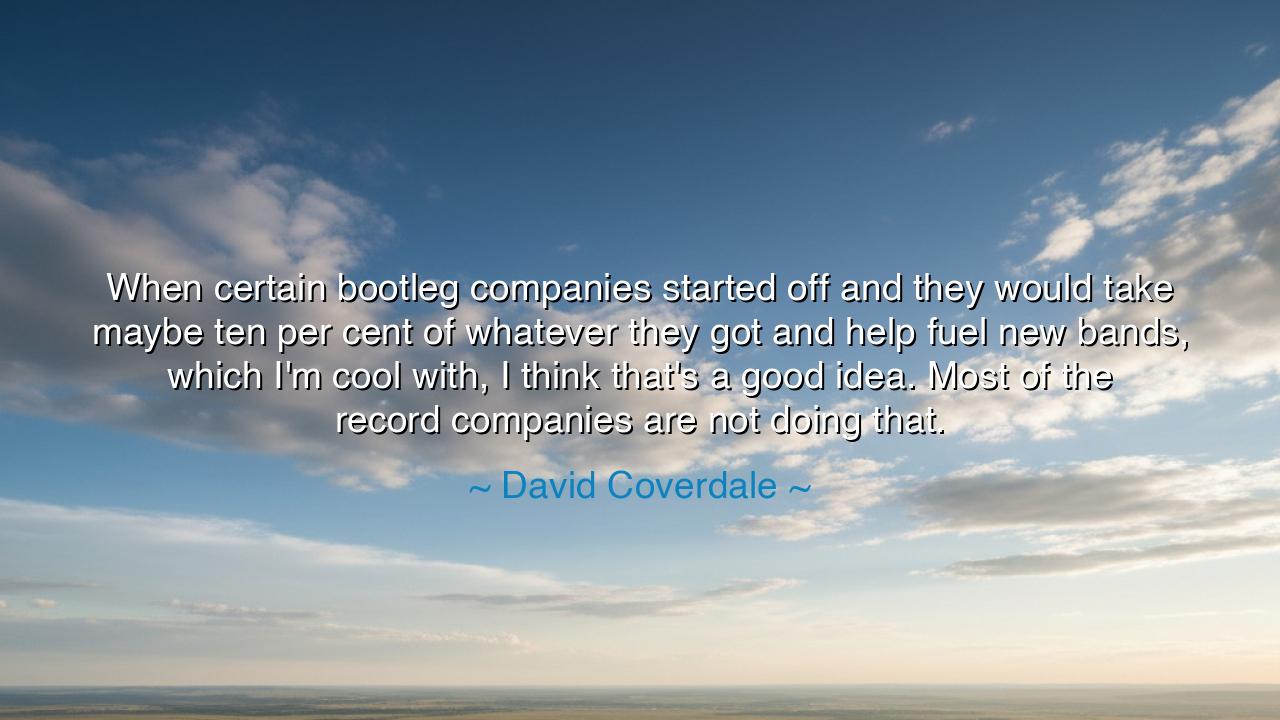
When certain bootleg companies started off and they would take
When certain bootleg companies started off and they would take maybe ten per cent of whatever they got and help fuel new bands, which I'm cool with, I think that's a good idea. Most of the record companies are not doing that.






In the words of David Coverdale, we encounter a poignant reflection on the relationship between creativity and the forces that seek to profit from it. The idea that certain bootleg companies, often seen as the villains of the music industry, took a portion of their earnings to fuel new bands—supporting emerging talent—presents a paradoxical view. On one hand, these companies operated outside the established norms, yet on the other, they became an unlikely source of empowerment for new artists. Coverdale’s words speak to the contradiction at the heart of the music industry, where corporate interests often stifle innovation, while those operating on the fringes of legality sometimes take steps to nurture creativity. His approval of these companies’ contributions to new bands is a reminder that sometimes, unconventional methods may be the ones that truly support growth and progress in the arts.
This idea is not new; it echoes the ancient wisdom of rebels and outcasts who have always operated on the margins of society to create and foster new movements. In the days of the Renaissance, artists like Leonardo da Vinci and Michelangelo were often patronized by individuals and institutions that were not part of the formal structures of society, but their art changed the course of history. Just as bootleg companies in the music industry once took risks to support the new generation of musicians, so did the patrons of the Renaissance help fuel a cultural revolution that would define the future of art and science. These patrons often worked outside the established norms, embracing the unconventional to ensure that creativity could thrive and push the boundaries of what was possible.
Consider also the story of The Beatles, whose rise to fame was not solely due to their contractual relationships with record companies, but through the underground networks of their time. Early in their career, bootlegs of their music circulated widely, helping to spread their sound and growing their fan base in ways the traditional industry could not. Their success was propelled, in part, by forces that existed outside the official structure of the music world. Just as Coverdale reflects on the value of companies that supported emerging artists, we see the same principle play out in the early days of some of the greatest musical talents. Without these bootlegs and underground support, the Beatles might have been just another unknown band in the sea of many.
The essence of Coverdale’s quote, therefore, lies in the concept of nurturing talent, not just for profit, but for the growth of culture itself. His acknowledgment of the role of these bootleg companies is a call for greater empathy and investment in the arts, something that corporate giants often overlook. Record companies, driven by their need for profit, may often overlook the potential of new talent, instead focusing on what is already established and commercially viable. This is a fundamental flaw in the traditional system—the refusal to take risks on new ideas and new voices. The bootleggers, by contrast, provided a space for new bands to grow, a platform for experimentation and new sounds, a practice that mainstream companies neglected.
The lesson to be learned here is clear: in all industries, the future of creativity relies on the support and nurturing of new ideas. Just as bootleg companies took the risk of backing unknown artists, so too must we as individuals, communities, and industries be willing to support innovation, even when it doesn’t fit the traditional mold. We must not wait for the mainstream to recognize new talent or ideas; instead, we must take the initiative to encourage independent efforts and unconventional paths. Sometimes, the greatest advances come not from those at the top, but from those at the edges, who see possibilities that others miss.
In our own lives, this speaks to the importance of taking risks in the pursuit of what we believe in. Whether in our careers, creative projects, or personal journeys, we must remember that sometimes the most rewarding paths are not the ones that follow the beaten track, but those that are overlooked or dismissed by the conventional forces around us. Like the bootleggers, we must be willing to support the underdogs, to nurture the new ideas, and to embrace the unconventional. In doing so, we create space for growth and innovation, ensuring that the future is built not by the few who dominate the present, but by the many who dare to dream and create.
Thus, let us take this wisdom from Coverdale’s reflection and seek to empower new voices and new visions, even when the world tells us that the system is not in their favor. The true power of art, music, and culture lies not in the hands of the few but in the collective effort to support and nurture the emerging voices that will one day shape the future. Whether it is through bootlegs or new forms of support, we must all play a part in making sure that the future of creativity is not controlled by the few, but is shared by all.






AAdministratorAdministrator
Welcome, honored guests. Please leave a comment, we will respond soon